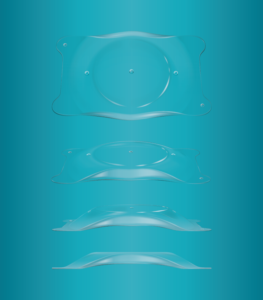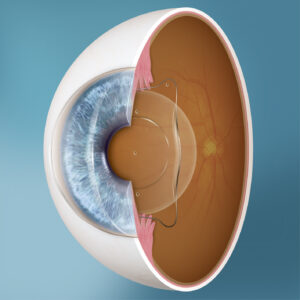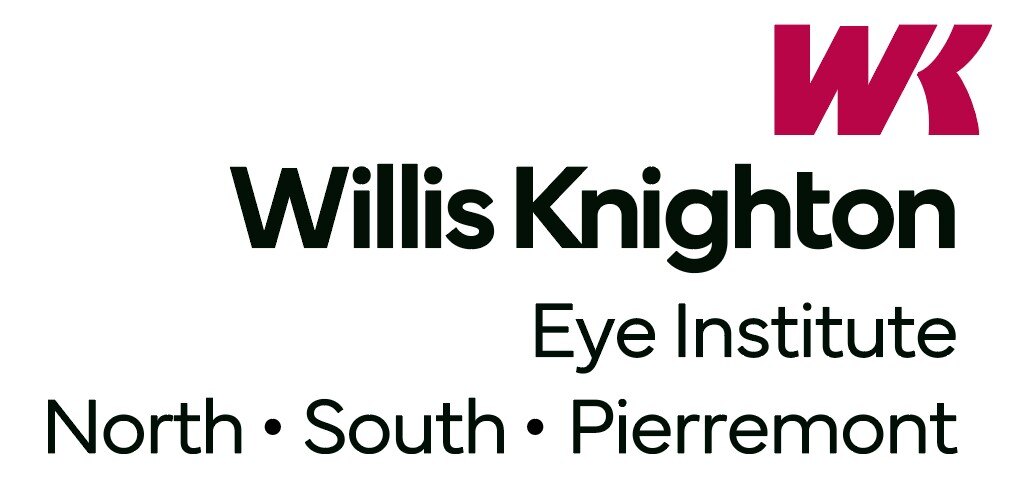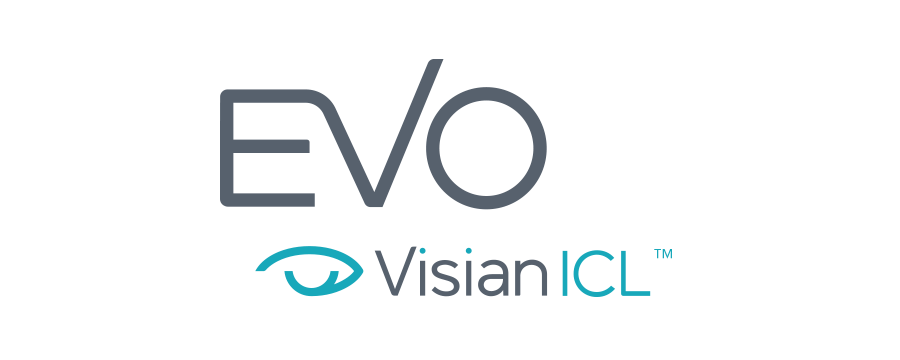Are you interested in reducing your dependence on visual aids? At Willis Knighton Eye Institute, Dr. Wyche T. Coleman, III, has extensive experience performing vision correction procedures that can provide you with greater visual freedom. We are proud to offer the new and advanced EVO Visian ICL to patients who qualify.
What Is EVO ICL?
An ICL is an Implantable Collamer Lens that is placed inside your eye to correct your natural refractive error. If you need visual aids like glasses or contact lenses to see clearly, it is likely due to a refractive error like nearsightedness, farsightedness, or astigmatism.
The EVO Visian ICL is a new and advanced type of ICL with numerous amazing benefits. The EVO Visian ICL can only correct vision in people who are nearsighted or have nearsightedness with astigmatism.
If you wear glasses or contact lenses to correct farsightedness or another type of refractive error, you will not qualify as a candidate for the EVO Visian ICL. However, other methods of permanent vision correction can allow you to achieve visual freedom.
The EVO Visian ICL is a tiny lens that, once placed inside the eye, will bend the light that enters your eye so it can land directly on the retina for you to have clear vision. An ICL works similarly to glasses and contact lenses, except the ICL is placed inside the eye instead of in front of it.
After ICL surgery with the EVO Visian ICL, you will be able to experience greater independence from visual aids.
What Are the Benefits of the EVO Visian ICL?
 There are numerous benefits to choosing the EVO Visian ICL compared to other ICL options. Unlike other vision correction methods, the EVO Visian ICL does not alter or remove any corneal tissue to correct vision successfully.
There are numerous benefits to choosing the EVO Visian ICL compared to other ICL options. Unlike other vision correction methods, the EVO Visian ICL does not alter or remove any corneal tissue to correct vision successfully.
Also, unlike other vision correction methods, the EVO Visian ICL procedure can be reversed anytime. If you and your eye doctor decide that the EVO Visian ICL needs to be removed, your eye doctor can do so at any point.
Beyond providing crisp, clear vision, the EVO Visian ICL procedure also offers UV protection and excellent night vision. The procedure to implant the EVO Visian ICL takes about twenty to thirty minutes and requires minimal downtime during recovery.
Since the EVO Visian ICL procedure does not alter any corneal tissue, this procedure will not cause dry eye syndrome. Possibly one of the most significant benefits of choosing the EVO Visian ICL over other types of ICLs is that it does not require an additional laser procedure called a laser peripheral iridotomy before ICL surgery.
The laser peripheral iridotomy procedure is required for patients to have prior to ICl surgery with other types of ICLs to avoid a spike in eye pressure after the procedure. Thanks to this unique benefit of the EVO Visian ICL, the ICL procedure is quicker, and the recovery time is shorter.
Once the EVO Visian ICL is in place, it is not visible.
Who Is a Good Candidate for the EVO Visian ICL?
Before you can schedule the EVO Visian ICL, you must first schedule a visit with Dr. Coleman at Willis Knighton Eye Institute for a consultation. The EVO Visian ICL is an excellent method of permanent vision correction for many people who are nearsighted.
To qualify as a candidate for the EVO Visian ICL, you must be between the ages of 21 and 45 and have nearsightedness or nearsightedness with astigmatism. Your eye doctor will also want you to have had a stable glasses prescription for at least a year before ICL surgery.
The EVO Visian ICL may be an excellent option for you if you desire greater visual freedom but do not qualify for other vision correction procedures such as LASIK. During your consultation, Dr. Coleman will perform a variety of tests and gather measurements of your eyes.
During this process, he will determine whether or not the EVO Visian ICL is a good fit for you. Most people are excellent candidates for the EVO Visian ICL.
What Happens During the EVO Visian ICL Procedure?

EVO ICL Procedure
The biocompatible Collamer material used in the construction of the EVO Visian ICL is designed to work harmoniously with your eye. The procedure is quick, and many people experience clear vision right away.
After numbing the surface of your eyes with anesthetic eye drops, Dr. Coleman will make a tiny opening in your cornea, the clear dome-shaped tissue at the front of your eye, in order to reach the area of your eye where the ICL will be placed. Next, they will insert the EVO Visian ICL and position it behind your iris, the colored part of your eye, and in front of your eye’s natural lens.
Once the EVO Visian ICL is positioned correctly, the procedure is complete. The tiny opening in your cornea will heal naturally during your recovery, without the need for sutures.
What to Expect After the EVO Visian ICL Procedure
Recovery after the EVO Visian ICL procedure is typically short and easy. Dr. Coleman will provide you with instructions on how to best recover from ICL surgery.
It is important to follow these instructions closely to avoid any possible complications. Depending on various factors, you may be able to return to work in as little as one to two days after the procedure.
Although many people experience clear vision right away after surgery with the EVO Visian ICL, you may experience blurry vision for a few days while your eyes adjust. In addition to this, you may also notice that your eyes are a little irritated during the first few days of recovery.
These symptoms are typically minimal and completely normal. You may also be prescribed eye drops to help your eyes heal.
It is essential that you take these as instructed in order to have a smooth recovery. Within a few days to weeks, you will be fully recovered and get to live life with a new sense of visual freedom!
Get the EVO Visian ICL in Louisiana
Are you interested in learning more about the EVO Visian ICL or determining if you may be a candidate for the procedure? Schedule an appointment at Willis Knighton Eye Institute in Shreveport, LA, today!
Joe Jonas Shares His Experience With EVO Visian ICL




